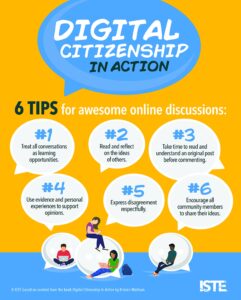Approaching ‘Digital Citizenship’ in my classroom has become as normal as defining classroom expectations at the start of each school year. I have the students give their input for defining classroom expectations both in person and online for the year. They usually come up with the same answers each time we do this, with some guidance or prompting from me. They know the difference between right and wrong (generally) by the time they reach the middle years, they just lose their way sometimes (I blame hormones). Beyond our own personal regulations that students help define, our school division has a “BYOT” policy (bring your own technology) where the students and their parents can sign forms that include a list of rules and expectations for the school year. These policies include appropriate use, and general “Netiquette.”
The overarching goal: Educating our students to be as kind online as they would be in real life. Or even more so.
Creating Connections
Besides general rules and guidelines, I feel as though it is also important to discuss topics like online relationship building. Commenting (or not commenting) on each other’s social media posts is a huge deal to kids at this vulnerable age. They do things like maintain ‘Snap Streaks’, form private group chats, post stories and photos, and ‘like’ or ‘comment’ on each other’s posts with things like hearts or fire emojis to show signs of approval or inclusion. Things that may seem miniscule to adults can weigh on their minds and make them feel included or left out at the mere click of a button.

Teaching Citizenship
Educating students to not only be kind online, but to also care about becoming active positive citizens in their online community will help them to feel a sense of belonging and maybe even provide opportunities to give back, if they are in a position to do so.
Another huge perk of becoming a member of any online community, is that it can help to foster relationships with people that have similar interests. I see this being a huge benefit, especially in small rural schools with small populations. The chances of having the exact same interests as someone in a small class of 8 are slim to none…so they can turn to the wonderfully expansive internet to seek out companionship. I watched this unfold firsthand when I taught a triple grade 6/7/8 class. It was beautiful to read their journals about what they did in their downtime, because they always wrote with little sparks of joy when speaking about their passions. Quite often, this was done with the help of their personal electronic devices, and a Wi-Fi connection. They could connect with other people outside of their small town limits about anything, whether it be about a passion for a band, a video game, or a sports team. One of my students built such a strong relationship with another student in Illinois about their love of Hamilton: The Musical, that their parents arranged for a visit swap, and both kids got to meet up in Chicago to see a production of the play, and then they came up to visit in small town Saskatchewan for a week.

Digital Citizenship for the Betterment of Society
We as teachers should also aim to assist our students in structuring their identities, and then to nurture or foster growth in a responsible manner. Also, to challenge their critical thinking, and to help them to create as an outlet. The overall aim of all of this is for the betterment of society, after all. We live online for such a huge portion of our lives now, so why not utilize it for the better and teach our students to do the same.

I have shared this platform in my classroom before and believe it is a solid initiative:
All in all, I believe that mentoring digital citizens is just as important these days as mentoring them “IRL” and we need to consistently guide our students to be kind online, and that they need to be able to stand behind what they say and do online.
3 Comments
Kennedy Loreth
Amanda,
I enjoyed reading your blog post for this week. I definitely agree with you on teaching our students to be as kind over the internet as they are in person, or even more so. Online bullying feels so common these days and I think it’s because of how easy it can be to hide behind a fake account/name and say something you absolutely wouldn’t have in person.
Reminding our students of the impact this can have on other children and teens is very important. The quote “sticks and stones may break my bones, but words will never hurt me” doesn’t seem relevant anymore, when words are being thrown around a little too lightly over the internet. Words can in fact hurt and it is crazy how I still see it happening as an adult. As a society, everyone needs to do a little better & be a little kinder.
Kennedy Loreth
Amanda Stecyk
Thanks, Kennedy! It is all too easy to hide behind the keyboard or even a fake account. I hope that the future is abound with more kindness online!
Rokhsareh Kakvand
Thanks for your informative blog post. I also believe that teaching digital citizenship and defining classroom expectations are so important. As educators, we have to structure students’ online identities and help them to grow in a good manner.